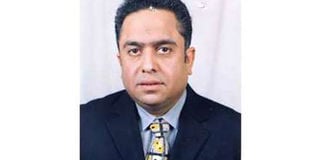Triton scandal mastermind Devani loses appeal

Yagnesh Devani, he is accused of orchestrating the Triton scandal. PHOTO | COURTESY
What you need to know:
- A warrant for his arrest was issued when he fled the country in 2009. He is believed to have arrived in Britain in 2009 or 2010.
- The case was heard at the Court of Appeal (Civil Division) after an appeal from the Upper Tribunal (Immigration and Asylum Chamber) in the UK.
Yagnesh Devani, the billionaire mastermind of the Sh7.6 billion Triton scandal who has been on the run for nearly a decade, could be prosecuted in Kenya after a court in the United Kingdom allowed his extradition.
Mr Devani lost his appeal against the extradition at the Court of Appeal in a case described as one “with a complicated and unsatisfactory procedural history”.
The conclusion of the case ends a nine-year cat-and-mouse game in the UK and brings the prospects of ending one of Kenya’s longest trials. The case was filed in court 11 years ago.
The businessman, who at the height of his power and notoriety was connected to the who-is-who in the Daniel arap Moi government, took a plea in a Kenyan court on June 16, 2009 after many years of attempts to have him tried.
A warrant for his arrest was issued when he fled the country in 2009. He is believed to have arrived in Britain in 2009 or 2010.
The case was heard at the Court of Appeal (Civil Division) after an appeal from the Upper Tribunal (Immigration and Asylum Chamber) in the UK.
CASE MISHANDLED
The appeal heard by judges Nicholas Underhill, Nicola Davies and Stephen Males was filed by the Secretary of State for the Home Department.
Though the case was heard on February 12, judgment was delivered on May 7.
Mr Devani was first charged alongside Triton Company Ltd, Mr Benedict Mutua of Kenya Pipeline Company (KPC), Mr Julius Kilonzo (Triton), Mr Phanuel Okwengu (KPC), Mr Peter Mecha (KPC) and Mr Collins Otieno (Triton) in 2009.
In 2008, he had 96,000 tonnes of processed petroleum valued at Sh7.6 billion released to him without authority from financiers of the cargo.
The mischief in the trial started days after senior officers at KPC and Triton denied 13 counts of irregularly releasing the petroleum products to the businessman.
Instead of Mr Devani standing trial with the others, then-Director of Public Prosecutions Keriako Tobiko – now Environment Cabinet Secretary – withdrew a case for which a warrant had been issued earlier.
The withdrawal was met with a public outcry. Another warrant of arrest for Mr Devani was issued 24 hours later.
HUMAN RIGHTS
Last year, the Anti-Corruption Court in Nairobi allowed the prosecution to introduce new statements in the case. By November last year, some 22 witnesses had been heard.
Kenya made its first extradition request for Mr Devani in 2011, citing fraud. Two years later, the government made another request.
Mr Devani challenged both requests, which ended up with drawn-out proceedings in a UK magistrate court.
After the court dismissed his requests on September 3, 2014, the businessman filed an appeal at the High Court.
On December 11, 2015, the Divisional Court dismissed his appeal. “One of Mr Devani’s grounds of challenge to his extradition was that prison conditions in Kenya are such that his detention, whether on remand or following any eventual sentence, would be in contravention of the European Convention on Human Rights,” the judgment reads.
The convention prohibits torture and inhuman, degrading treatment or punishment. The Divisional Court found that prison conditions in Kenya “generally are convention-compliant”.
The Divisional Court upheld the magistrate court’s ruling “because the Commissioner of Prisons in Kenya and its Director of Public Prosecutions wrote formal letters of assurance to the Home Office stating that Mr Devani would be detained at Kamiti prison, where accommodation and facilities are convention-compliant and where he would have a cell to himself”.
SEEKING ASYLUM
About two months after the decision by the Divisional Court, Mr Devani applied for asylum on February 16, 2016. However, the Secretary of State rejected the application.
Not ready to go down without a fight, he appealed to the First-tier Tribunal, which is responsible for handling cases on decisions made by the Home Office relating to permission to remain in the UK, deportation or entry to the country.
“Mr Devani relied on the Refugee Convention and a contention that, notwithstanding the assurances relied on by the district judge in the extradition proceedings, the prison conditions in Kenya do not comply with the European convention,” the judgment reads.
Mr Devani said such assurances were given to Mr Gilbert Deya, the miracle babies evangelist, upon which he was extradited to Kenya.
To support his argument, Mr Devani cited an article “Insects keep on biting me, says preacher Gilbert Deya at Kamiti Prison”.





